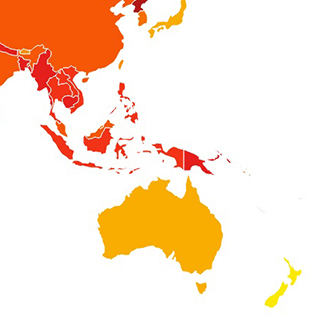Back at number one and it’s personal
 This point was echoed by the Brian Picot Chair in Ethical Leadership at Victoria University, Professor Karin Lasthuizen.
This point was echoed by the Brian Picot Chair in Ethical Leadership at Victoria University, Professor Karin Lasthuizen.
New Zealand has worked hard to have a public sector with high integrity, which has been reflected in our ranking on Transparency International’s Corruption Perceptions Index for a long time. We are usually ranked either first or first equal in the world, but we slipped to second and fourth in 2014 and 2015.
It’s certainly good to be back at number one (at least, first-equal with Denmark) on the 2016 index. But we are not complacent.
In 2012, our Office’s work on fraud helped lead to an increase in awareness and action. Now all of us in the public sector have an opportunity to raise awareness and understanding of bribery and corruption.
Lyn told the Integrity Forum that the second word in “Corruption Perceptions Index” matters as much as the first. She has seen an increase in accusations of corruption during her term as Auditor-General, even though the Office’s inquiries have not upheld those accusations.
The increasing perception of corruption should be of concern to us all, Lyn said.
“Without transparency, allegations of corruption will flourish. Without transparency, people wonder what their politicians and officials are trying to hide. We can hardly blame them.”
As public sector auditors, we meet thousands of public servants committed to improving the lives of New Zealanders. They’re doing a great job, but our reputation is a fragile thing. There is plenty that can go wrong. Public entities can get too focused on avoiding risk, ticking boxes, following processes, and managing throughputs. Of course we need systems, but what comes first in maintaining integrity is concern about people.
Karin’s presentation on research in ethical leadership reinforced Lyn’s emphasis on concern for people. She told the forum that ethical leadership and explicit communication about ethics is particularly important for combatting unethical behaviour. Communication about ethical values and norms, and open discussion about ethical dilemmas, helps reduce perceptions of favouritism inside an organisation, and discrimination outside of it.
The Kiwis Count Survey run by the State Services Commission shows that New Zealanders' trust in public services by experience is consistently much higher than their perception of trust. By both measures, trust has increased markedly since 2007. It shows that their trust is closely linked to their personal contact with the public sector.
In her last address as Auditor-General to the public sector, those at the Forum might have expected a discussion of accounting and financial management challenges and of the systems that could be improved. But Lyn showed the forum the trait that has made her distinctive as an Auditor-General – her willingness to talk about the issues that matter for people.
She challenged the public sector to focus on, and find ways to improve, five issues that trouble us all and blight so many of our lives: and that undermine our integrity:
- Suicide – the third leading cause of premature death in New Zealand. Every suicide is a tragedy. Our Office has tried to contribute to this complex problem by looking at how information is collected and used to prevent future suicides.
- Mental health – in our Office, as in communities throughout New Zealand, no one’s life is untouched by the pain of suicide and mental health related issues. In the next few months, the new Auditor-General, Martin Matthews, will present a report on acute care of mental health patients.
- Māori education – too many Māori children leave school without the education they deserve. The achievement gap between Māori and non-Māori is closing too slowly. As an Office, we are proud of our reports on Māori education, and we hope the sector will have the courage to do what is needed to help Māori students achieve their full potential.
- Jobs for youth – we are an organisation that recruits graduates who are beginning careers to become our future public sector leaders and finance managers. Too often we hear the phrase “we want experienced people”! How does a young person get experience with that attitude?
- Family violence and its impact on children – in her eight years in Police, Lyn says she saw the impact of family violence again and again. Family violence is not acceptable.
Staying at number one on the Corruption Perceptions Index means making it personal – having the uncomfortable conversations to find ways to tackle the issues that matter for people.
